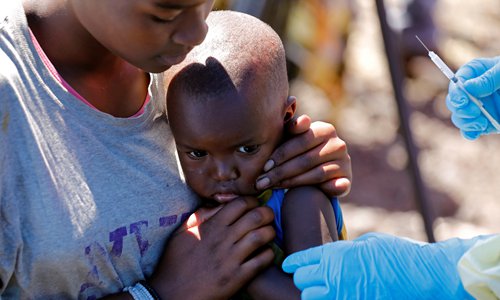HOME >> WORLD
WHO ‘rationing’ Ebola drug in DRC
Source:AFP Published: 2019/9/23 20:38:42
Not enough people getting vaccines: Doctors Without Borders

A child reacts as a health worker injects her with the Ebola vaccine, in Goma, Democratic Republic of Congo on Monday. Goma, a city of nearly 2 million people, is on high alert after the first transmission of the virus within it was confirmed last week. Photo: VCG
Aid group Doctors Without Borders (MSF) on Monday accused the World Health Organization (WHO) of rationing the Ebola vaccine in the Democratic Republic of the Congo where more than 2,100 people have died of the deadly virus.
"One of the main problems currently is the fact that in practice the vaccine is rationed by the WHO and that too few people at risk are protected today," MSF said in a statement.
It called for "the creation of an independent international coordination committee" to "guarantee the transparency of the management of stocks and data sharing."
Around 225,000 people have received the Ebola vaccination manufactured by German pharma giant Merck since August 8, 2018, "but this number remains largely insufficient," MSF said.
"Up to 2,000-2,500 people could be vaccinated every day, against the current 50-1,000 people," MSF director of operations Isabelle Defourny said in the statement.
"MSF's efforts to expand access to the vaccination in collaboration with the Ministry of Health... have come up against tight control imposed by WHO on supplies of vaccines," MSF said.
"The reasons behind these restrictions remain unclear," it said, adding that the current vaccine had "demonstrated its safety and effectiveness."
The medical charity also said that a shortage of the vaccine could not be the reason for the low numbers being vaccinated.
"Merck has just announced that in addition to the 245,000 doses already delivered to the WHO, they were ready to send 190,000 more doses if necessary and that 650,000 more would be made available in the next six to 18 months," it said.
The WHO denied limiting the availability of the drug, saying it was doing "everything possible" to end the epidemic. "We partner closely with the DRC government to reach as many communities and individuals in the outbreak area as possible and are not limiting access to vaccine but rather implementing a strategy recommended by an independent advisory body of experts and as agreed with the government of the DRC and partners."
The criticism comes after DR Congo Health Minister Oly Ilunga stepped down on July 22 after being replaced as the head of the country's Ebola response effort. He criticized the WHO's plans to introduce a new, unlicenced vaccine to fight Ebola in his resignation letter.
The WHO has been pushing for the introduction of a second vaccine produced by a subsidiary of US company Johnson & Johnson, but the health ministry under Ilunga had resisted such a move, citing the risks of introducing a new product in communities where mistrust of Ebola responders is already high.
The Merck vaccine is tested but unlicensed, while the second drug is still in the trial investigation stage.
Posted in: AFRICA